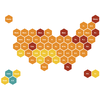TSA Keeps Face Mask Requirement On Public Transportation Through September : Coronavirus Updates : NPR
A sign about masks being required is seen as travelers prepare to check in for a flight in Miami on Feb. 1. The Transportation Security Administration is keeping strict regulations on mask wearing when traveling domestically.
Joe Raedle/Getty Images
hide caption
toggle caption
Joe Raedle/Getty Images

A sign about masks being required is seen as travelers prepare to check in for a flight in Miami on Feb. 1. The Transportation Security Administration is keeping strict regulations on mask wearing when traveling domestically.
Joe Raedle/Getty Images
Wearing a face mask will continue to be a requirement at airports, aboard commercial flights and on other public transportation around the country through the summer.
The federal mask mandate, which was set to expire on May 11, will remain in effect through Sept. 13, according to updated guidance issued by the Transportation Security Administration on Friday.
The rule also applies to buses and rail systems and was first put in place by President Biden shortly after he took office in January.
For over a year, major U.S. commercial airlines have required all passengers who are over 2 years old to wear face masks on flights. The policy has sparked some backlash from people refusing to keep their masks on, often delaying flights.
The TSA’s extension comes as average confirmed U.S. cases of COVID-19 and deaths as a result of the coronavirus continue to decline.

“The federal mask requirement throughout the transportation system seeks to minimize the spread of COVID-19 on public transportation,” senior TSA official Darby LaJoye said in a statement.
“We will continue to work closely with the Centers for Disease Control and Prevention (CDC) to evaluate the need for these directives and recognize the significant level of compliance thus far,” she added.
Just this week, the Centers for Disease Control and Prevention said people who are fully vaccinated do not need to wear a mask when they’re outdoors unless they’re in a crowd.

According to NPR’s vaccine tracker, over 40% of the U.S. population has received their first dose of a COVID-19 vaccine and about 30% is fully vaccinated. CDC data also projects that close to 85% of the country could be fully vaccinated by the end of August.
Travel numbers are also rising. TSA reported that 1.56 million people traveled through airport checkpoints on Friday, compared to around 171,000 on the same day in 2020. Just weeks earlier, TSA reported its highest point of air travel since the pandemic began, with over 1.58 million people traveling. That said, numbers remain significantly lower than in 2019.

At the beginning of April, the CDC announced that Americans who are fully vaccinated can safely travel in the U.S. while still wearing a mask and socially distancing. The guidance specifically notes that nonessential travel should continue to be avoided when possible.
While the prospect of Americans traveling internationally faces additional roadblocks, fully vaccinated Americans will be permitted to travel to countries within the European Union this summer. Currently, travel to the U.S. from much of Europe is restricted.

A handful of international travel bans also remain in place for several countries outside of the European Union, including in the United Kingdom, South Africa and Brazil, where contagious variants of the virus have originated.
India is the latest country to face heightened restrictions from the U.S., following a continuing surge of COVID-19 cases throughout the country. The ban on travelers from India is set to officially take effect Tuesday.
